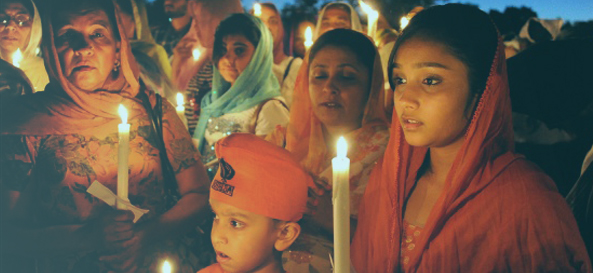
When I spoke at Wheaton College during a public conversation on Christian and Muslim perspectives on religious diversity, I was impressed again and again by the students who stood up during the Q&A session and shared experiences they’d had meeting deeply religious peers of other traditions.
A few years ago, you wouldn’t have necessarily expected that from your typical student at an elite Christian college. But these students had made non-Christian friends through service experiences with the diverse Chicagoland community surrounding Wheaton, through mission trips or study abroad programs outside the US, or even just as high school students growing up in a religiously diverse America. These students seemed to understand that being a Christian in the 21st century meant being friends with people of other faiths.
Cut to a few months later, to the seminary course on interfaith work and youth ministry I was teaching with a few evangelical colleagues at Princeton Theological Seminary. Many of our students were future church leaders, graduates of Wheaton or other illustrious evangelical and Christian colleges. We kicked off with a role play—imagine a student in your college ministry approached you because she had become friends with a Muslim student on campus, and she was looking to you, as a Christian leader to help her make sense of that friendship. All of the answers we got were kind and gentle and thoughtful. But they weren’t particularly Christian answers. The students didn’t talk about their relationships to Jesus and how that helped them to understand their relationship to the religious other. They didn’t draw on the Gospels, thinking about how stories like the Good Samaritan might speak to religious diversity. They didn’t point to the Christian legacy of interfaith cooperation, like St. Francis’ relationship of interfaith dialogue and peace-building with Muslims during the Crusades.
It struck me that even though many Christians understand religious diversity is now a reality of their ministries, they still haven’t figured out how to flex the theological muscles that speak to that reality. The default way of talking about other religions—strictly in terms of conversion—seems over-simplified (if not still deeply significant) when so many Christians are having intense and meaningful relationships. If, however, our scenario had been a different topic—say, a student had experienced extreme poverty for the first time, or realized the magnitude of the global AIDS crisis and wanted to talk to her pastor about how her faith speaks to that—I imagine the response would have been easier for our students to get out and distinctly Christian. Such a response would be grounded in a refined and nuanced theology of Christian compassion and social action, and would speak in terms of Jesus Christ, be laced with passages from the Bible, and draw on examples from Christian history.
We were challenging our Princeton students to come up with a “theology of interfaith cooperation.” It’s important to say that “interfaith cooperation” doesn’t mean all religions are the same at the core, or our differences should be watered down. It also doesn’t mean we don’t have real disagreements and exclusive truth claims that may come into conflict with one another. It does mean, however, that we have shared values in common, values that diverse religious traditions insist their followers act on, like mercy, compassion, hospitality and service. Interfaith cooperation begins with those values, asks what we can do together in the world based on those values and how we might build relationships through that work together. As a Muslim, I am called to care for those who suffer in my community, called to be a good steward of creation, called to seek justice and mercy wherever I go. As a Christian, are you called to care about these things? And if so, can we work together on them? A theology of interfaith cooperation lives honestly alongside your theology of salvation and evangelism, but also asks what in your Christian faith—your relationships to Jesus, your understanding of the Bible, your knowledge of Christian history and tradition—speaks to why you might work together with people of other faiths on issues of common concern. It asks you to understand this work in distinctly Christian terms, not just as an inevitable byproduct of living in a religiously diverse world.
As a Muslim, why do I care about Christians’ ability to articulate a theology of interfaith cooperation? First, because I believe the only way I can make a dent on the issues my faith calls me to care about is if I work with you. And I suspect you realize you can accomplish more, too, if we work together. Rick Warren once told me he started thinking about interfaith work when he realized the two most powerful forces in the countries where he does development work were the local church and the local mosque, and that they had unmatched social capital to solve the problems he felt called to address as a Christian. Second, I care because I believe if we are open to talking about what we really believe, we have a chance to counter the religious bigotry, ignorance and conflict that currently dominates our media and taints so many relationships. I love being around evangelicals, because they don’t apologize for what they believe. Being around evangelicals makes me feel like I am safe to talk about my beliefs and represent my Muslim faith for myself, and also gives me hope we can build the kind of understanding that might actually counter the religiously-motivated hate and violence tearing apart our world.
As a Christian leader who cares about building the church, why should you care about being able to articulate a theology of interfaith cooperation? Because many Christians—particularly young Christians—are asking hard questions about religious diversity and the Christian answers aren’t clear. For the church to remain relevant in a religiously diverse world, Christian leaders must learn to articulate how and why Christians can relate to non-Christians in ways that aren’t just about conversion, and how and why such a response is in fact deeply Christian. If every student in that auditorium at Wheaton was asking that same question, what does it mean that future Christian leaders are struggling to find a compelling answer?





















